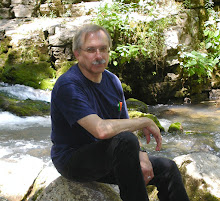12 September 2012
Shared Significant Experiences
There is a thought system behind every culture. We call this worldview. It is also called Cognitive Culture. It is natural to one growing up in that cultural setting. But someone from another culture has to start at the bottom to learn how to communicate and relate in that worldview.
Our cultural research probes for the key features of a people's worldview to enable communicators to make sense in that cultural setting. Cultures are based on collective group experience. New experiences are interpreted in light of previous experiences. Thus change may be slow and difficult, new concepts hard to understand and accept, even if better (in some views).
Mediterranean
After living in East Africa for about 25 years, I spent some years living in Cyprus, an island country in the Mediterranean a few miles from Turkey and Syria. There I was the cultural research coordinator for a company called Geolink Resource Consultants. We provided cross-cultural training and media production, and training in cultural research and worldview investigation, primarily for people from other parts of the world living and working in Northern African, Middle Eastern or Asian countries.
Underlying all our research and media training is the worldview of the various peoples* we interact with. This worldview focus entails oral culture concepts, since most peoples of the world are not literate and abstract in the western sense, but oral and relational in culture and learning style.
How We Think
This is a whole different matter from the technical ability of functional literacy. We are talking here about how people think and make decisions.
Early cultural experiences set the basic patterns for understanding the world around us, and for dealing with later experiences. Significant life experiences we share with our closest society -- family and beyond -- become the basis of worldview and the social patterns for living. This is why cultures and worldviews are different -- different families, communities, ethnic groups, peoples have different sets of experiences, and thus view the world differently.
Shared Significant Experiences
These Shared Significant Experiences are the common treasure of reference for a family, community, extended family, tribe or nation. The "common sense" of any human family or society consists of these shared memories, concepts and beliefs and the world and reality. This is the "worldview" which resides in the heads and hearts of each member of that society.
Their language and history are components of this set of experience, as well as their religious experience. Thus we try to discover these deep concepts through worldview investigation to understand the peoples of the world and how they communicate, to learn how to relate and communicate the good news to them.
Experience and Reality
The core of common experiences is a shared reality for those who are part of it. The more different the most significant experiences are, the more various individuals and families will differ from one another. The differences occur by generation, geography, lineage or other significant characteristics of human society.
This is why generations move away from their elder generations, slightly or radically, one party or clan sees things differently, has different ideas of how to meet a crisis, etc.
* The term "peoples" refers to what are also called by the more recent term "people groups," "ethnic groups" or "ethnicities". Earlier this was the meaning of the term "nations," which in the recent modern era came to be applied to geo-political states, called "nation states," the common format in today's political world. For instance in the words of Jesus "Nation (ethnos) shall rise up against Nation (ethnos)" the meaning is that tribes or ethnic groups will be fighting. A pattern of our human history and current world scene!
Learn more about this concept of Worldview as Shared Significant Experiences on these links:
Culture and Shared Experiences
Culture and Experience
Cognitive and Social Culture
Culture, Learning and Communication
Ethnicity and Nationality in Mixed Genetics:
What Makes a "People"?
Socialization and Self-Identity
What is Worldview - PowerPoint Presentation
This blog article includes material first published in November and December 2000 in The Cyprus Sentinel, a periodic newsletter on cross-cultural communication, published in Nicosia, Cyprus
Developed 31 January 2012
Finalized and posted on Topics and Thoughts 11 September 2012
Subscribe to:
Post Comments (Atom)


No comments:
Post a Comment